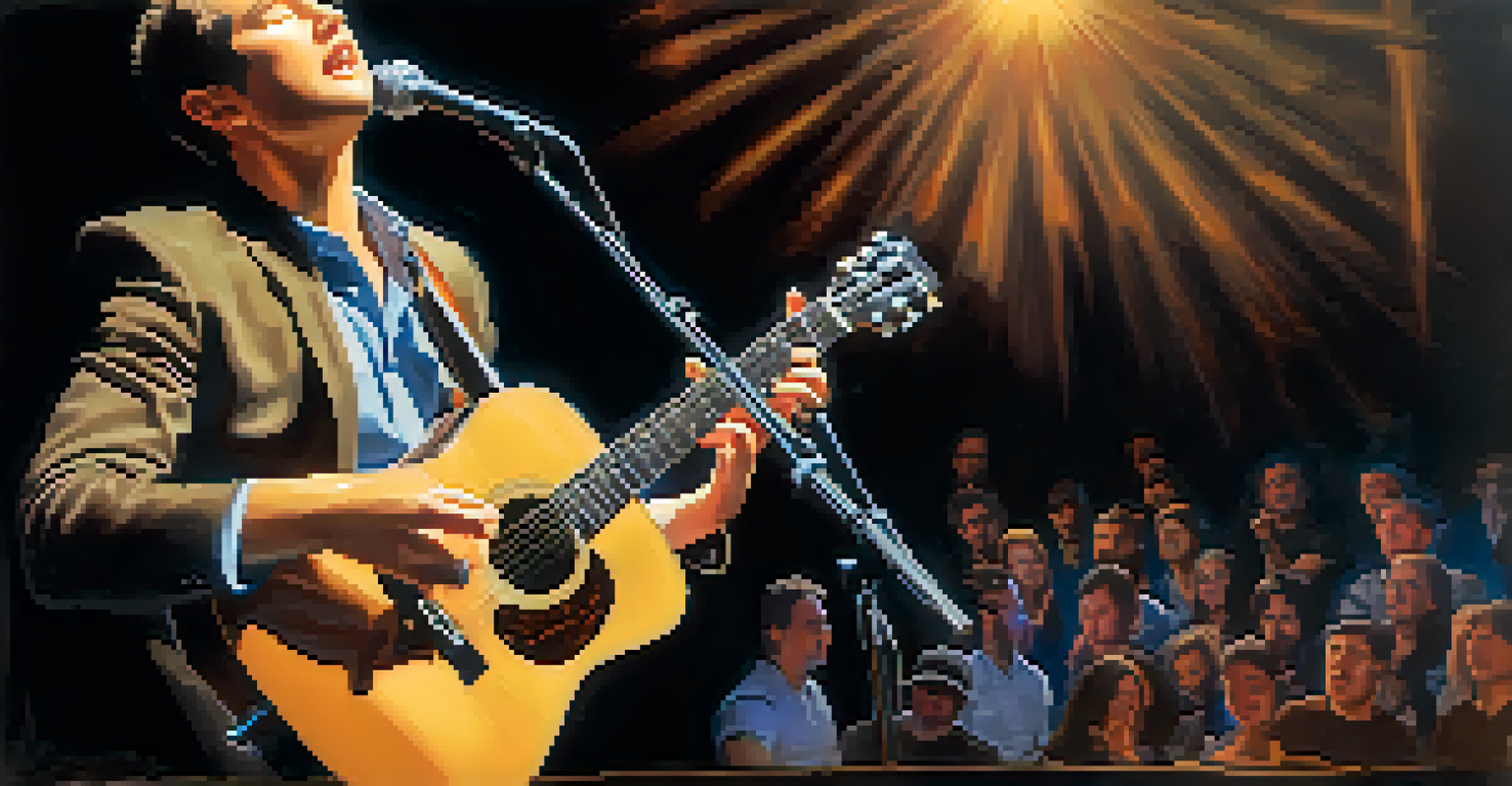Understanding Music Copyright: Protecting Your Work

What is Music Copyright and Why Does It Matter?
Music copyright is a legal framework that protects the original works of musicians, songwriters, and producers. It ensures that creators have exclusive rights to their compositions, recordings, and performances, preventing unauthorized use. Just like you wouldn’t want someone to take credit for your hard work, copyright helps safeguard your creative identity.
Copyright is not just a legal concept; it’s a way to protect creativity and ensure that artists can continue to create.
Without copyright, anyone could take your music, modify it, or use it commercially without your permission. This can lead to financial losses and emotional distress for artists who put their heart and soul into their creations. Understanding music copyright is crucial for anyone involved in the music industry, as it not only protects their work but also lays the groundwork for potential revenue streams.
Moreover, music copyright fosters an environment of creativity and innovation. When artists know their rights are protected, they are more likely to take risks and experiment with their music. This leads to a vibrant music scene where new sounds and ideas can flourish, benefiting both creators and listeners alike.
Types of Music Copyright: What You Need to Know
There are primarily two types of music copyright: 'musical composition' and 'sound recording.' The musical composition refers to the melody, lyrics, and arrangement of a song, while the sound recording pertains to the specific performance of that composition. Understanding these distinctions is essential for artists, as each type has its own copyright protections and registration processes.

In addition to these two main categories, there are also related rights, such as neighboring rights, which protect performers and producers of sound recordings. This means that even if you're not the songwriter, you still have rights over your performance or the recorded version of a song. Knowing these rights can help you navigate the complex landscape of music copyright effectively.
Music Copyright Protects Creators
Music copyright safeguards original works, ensuring that artists have exclusive rights and preventing unauthorized use of their creations.
Furthermore, artists should be aware of how copyright laws can vary by country. If you are distributing your music internationally, it's vital to understand the copyright protections in those specific regions. This knowledge can help prevent unintentional infringement and ensure that your rights are upheld globally.
How to Obtain Copyright Protection for Your Music
Automatically, your music is protected by copyright the moment it is created and fixed in a tangible form, like a recording or a written score. However, registering your work with the copyright office can offer additional legal benefits, such as the ability to sue for statutory damages in case of infringement. Think of copyright registration as a safety net that provides more security for your creations.
The best way to protect your music is to understand the copyright laws that apply to it.
To register your music, you typically need to fill out an application, pay a fee, and submit a copy of your work. This process may seem daunting, but it's relatively straightforward and can be done online in most countries. By taking this step, you not only reinforce your rights but also establish a public record of your ownership.
In addition to registration, it's wise to keep thorough records of your creative process, including drafts, recordings, and any correspondence related to your music. These documents can serve as evidence in the event of a dispute. Having clear documentation helps strengthen your case should you ever need to defend your rights.
The Role of Music Licensing in Copyright Protection
Music licensing allows creators to grant permission for others to use their music, which can be a lucrative avenue for artists. By licensing your work, you can earn money through various channels, such as film, television, advertising, and streaming platforms. It’s like renting out a room in your house; you still own it, but others can enjoy it for a fee.
There are different types of licenses, including mechanical licenses for reproducing music and synchronization licenses for pairing music with visual media. Understanding these categories can help you maximize the potential uses of your music while ensuring you're fairly compensated. It’s essential to consider licensing as an integral part of your music career strategy.
Types of Copyright Explained
Understanding the differences between musical composition and sound recording is vital for artists to navigate copyright protections and registration.
Additionally, working with a music licensing agency can simplify the process. These agencies often have established connections in the industry and can help you navigate the complexities of licensing agreements. They make it easier for you to focus on your music while ensuring your work is used legally and profitably.
Common Copyright Infringements Musicians Face
Even with copyright protection, musicians often encounter various forms of infringement. Unauthorized duplication, sampling without permission, and unlicensed public performances are just a few examples. These infringements can significantly affect an artist's income and reputation, making it crucial to stay vigilant about how your music is used.
The rise of digital platforms has made it easier for unauthorized use to occur, whether through online streaming or social media. For instance, a song can go viral on a platform without the artist's consent, leading to potential revenue loss. This scenario underscores the importance of understanding your rights and monitoring the usage of your work.
Moreover, it's essential for artists to educate themselves about fair use, a legal doctrine that allows limited use of copyrighted material without permission. Although fair use can be a gray area, knowing its implications can help you navigate potential conflicts. Awareness and proactive measures are key to protecting your music from infringement.
The Importance of Seeking Legal Help for Copyright Issues
Navigating the world of music copyright can be complex, and it’s not uncommon for artists to encounter legal challenges. Seeking the assistance of an attorney who specializes in music copyright can be invaluable. They can provide guidance on protecting your rights, negotiating contracts, and addressing infringement issues effectively.
Legal help can also be crucial when it comes to understanding licensing agreements. These documents can be dense and filled with legal jargon, making it easy to overlook critical details. A knowledgeable attorney can help demystify these contracts, ensuring you don’t inadvertently give away more rights than you intend.
Legal Help is Crucial for Artists
Seeking legal assistance can help musicians effectively address copyright issues, negotiate contracts, and protect their rights in a complex industry.
Additionally, having legal representation can strengthen your position in disputes. Whether you’re dealing with a licensing disagreement or a copyright infringement case, an attorney can advocate for your interests and help you achieve a favorable resolution. It’s an investment in your career that can pay off in the long run.
Conclusion: Protecting Your Music is Essential for Success
Understanding music copyright is crucial for anyone involved in the music industry. It not only protects your creative work but also opens the door to potential revenue opportunities through licensing. By being proactive about your copyright, you can focus on what you do best: creating music.
The music landscape is ever-evolving, with new challenges and opportunities arising regularly. Staying informed about copyright laws and best practices can help you navigate this landscape with confidence. Remember, knowledge is power when it comes to protecting your rights as an artist.

In the end, music copyright is about more than just legal protection; it's about valuing your creativity and ensuring that your contributions to the world of music are respected and compensated. Embrace this knowledge, and you’ll be well on your way to a successful music career.